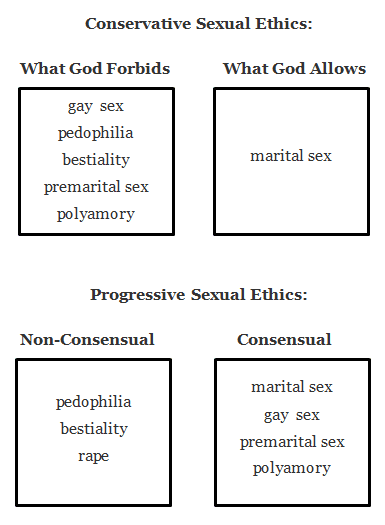I recently came upon an excellent example of what I was talking about when I wrote my “The Tale of Two Boxes” post several years ago. Homeschool leader Chris Jeub had this to say in a recent blog post titled “Patriarchy Has Got To Go“:
In a nutshell, Phillips is being sued by his former nanny, someone he knew for over a decade and was very close to the Phillips family. Her lawyers have graphic details of Phillips forcing himself sexually, and Phillips’ lawyers are denying little of it, claiming “consensual” contact between adults.
For those of us in the Christian homeschool community, this is just as bad as guilty. Phillips is a married man and father of eight children. This behavior is inexcusable.
Jeub writes that a married man having a consensual affair is “just as bad” as a married man sexually assaulting a woman, because both involve sexual immorality. When Jeub posted this piece on his facebook wall, a lively discussion ensued between him and a number of homeschool graduates. In that discussion, Jeub admitted that consent is “a topic that I don’t know much about.” I want to weigh in here because of the relevance of my two boxes thesis to this conversation.
First, I want to note that the Christian homeschooling world has a problem with consent, and with sex education in general. In a followup to her February expose on Patrick Henry College’s handling of sexual assault, journalist Kiera Feldman revealed that the board of Patrick Henry College has acknowledged that sex education has often been limited for those growing up in Christian homeschool families.
Of all the developments at Patrick Henry in the past month or so, this was perhaps the most heartening: Daniel Noa, the president of the alumni association, reported back from the spring Board of Trustees meeting, where the article was discussed at great length. Noa wrote:
There was definitely a consensus among the board members, many of whom have had long associations with homeschooling, that sex education in homeschooling circles has often been quite inadequate, particularly in dealing with the issues of consent, assault, aggressive advances, and other relevant issues. The board instructed administration officials to look into models of how this could be addressed with students as part of the orientation process. Instructions were also given to look into expanding the provision for mental health needs that the college is already offering.
This was definitely my experience—growing up homeschooled K-12, I was not introduced to the concept of consent until college (I attended a state university). What is perhaps distressing, though, is the realization that it is not just homeschooled students in these communities who lack an understanding of consent but also homeschool leaders like Jeub. This is a problem that needs correcting.
In his post, Jeub dismisses the relevance of consent to the Doug Phillips scandal because the primary point, for him, appears to be whether there was sexual immorality (aka extramarital sex), not whether there was consent. Given that there was sexual immorality regardless, Jeub doesn’t see the point of arguing about whether or not there was consent.
But consent matters. Consent matters a lot.
In a consent-based system of sexual ethics, a married man who has consensual sex with a woman he is not married to, but does so with the consent of his wife, has not done anything wrong. A married man who sexually assaults a woman he is not married to behind his wife’s back, in contrast, has wronged both women. In a traditional evangelical system of sexual ethics, however, there is no difference between these two cases—both are wrong because both involve sexual immorality. Consent is irrelevant—and that is why Jeub wrote that consensual sex between two unmarried adults was “just as bad as” rape.
In “The Tale of Two Boxes” I illustrated how thoroughly different a consent-based system of sexual ethics is from the traditional evangelical system of sexual ethics. The two systems determine which sex acts are right or wrong by a drastically different metric and with drastically different results.
In one of his facebook comments, Jeub acknowledged that Phillips’ position as Lourdes employer put him in a place of dominance over her that enabled him to manipulate her, and recognized that this makes Phillips a cad and a predator. But Jeub seemed primarily concerned that Phillips took advantage of his position to “pervert on” a woman in his charge. He found whether Lourdes was assaulted and coerced or a willing and active participant irrelevant. The concern appeared to be less about consent than about corruption. And that, quite frankly, is a problem.
I would urge Jeub and other homeschool leaders to shift from judging sexual acts by whether or not they involve marital sex to judging them by whether or not there is consent. A sexual ethic that puts rape in the same category as consensual premarital sex is fatally flawed. That Lourdes’ relationship with Phillips was not consensual matters a great deal, and not just legally. It matters ethically as well—or at least it very much ought to.
I’m tired of reading about sexual assault as a violation of purity rather than as a violation of personhood.
For additional reading, see Let’s Talk about Christian Culture and the Concept of Consent in Relationships, Why Purity Culture Doesn’t Teach Consent part 1, and Why Purity Culture Doesn’t Teach Consent part 2.















